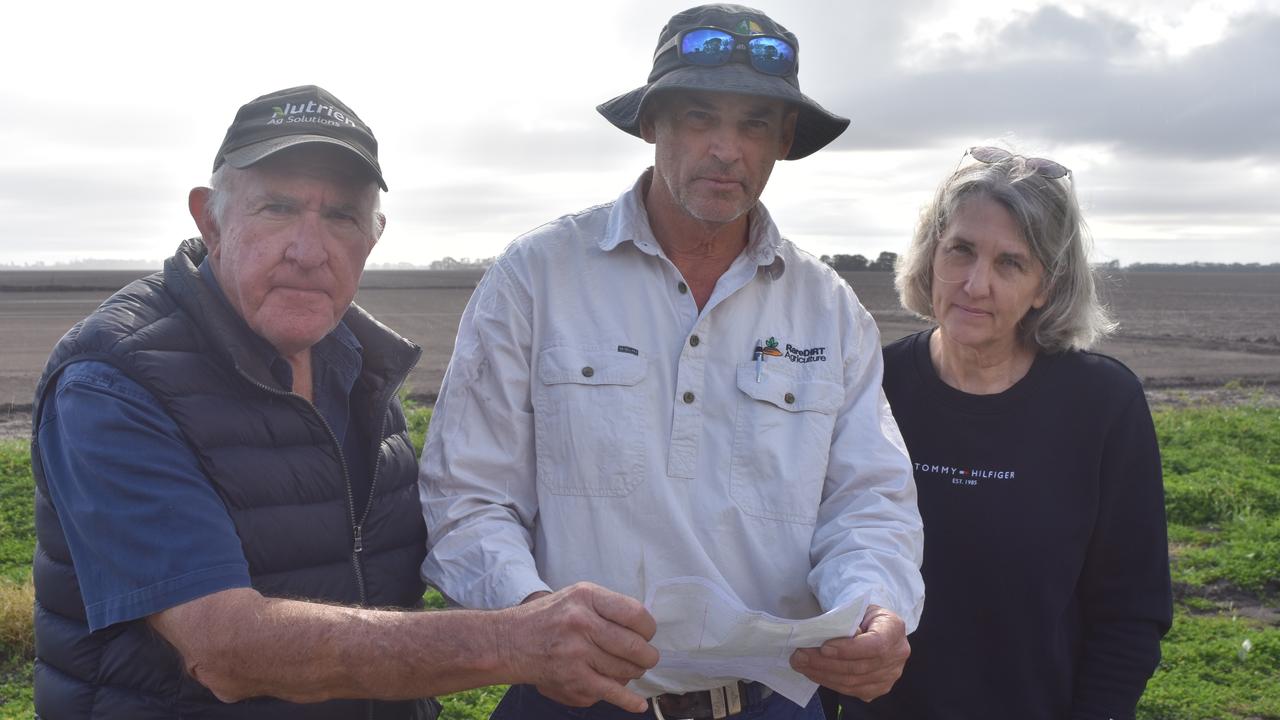Fired up: Region’s farmers take on gas giant on alleged illegal activity
‘We’re not going to give up’: The fight continues between farmers on the Darling Downs and a multinational gas company.

News
Don't miss out on the headlines from News. Followed categories will be added to My News.
It takes a lot to break farmers, but after facing the ongoing impact of what they have alleged was illegal drilling operations on their properties, landowners are calling for action.
The fight continues between farmers on the Darling Downs and Arrow Energy, a Royal Dutch Shell-Petro China-owned gas company.
Tension over the issue which started when landowners alleged the gas giant committed land access breaches after illegally drilling several coal seam gas wells beneath a nearby property, without negotiating with the owners.
Zena and Garry Ronnfeldt have been operating their farm near Dalby since 2014 and during this time, the couple have faced drought, floods and adverse weather challenges.
But the landowners said nothing compared to the issues they had encountered since the multinational gas company drilled several gas wells beneath their property – activity they claim was illegal.
Ms Ronnfeldt said as a result of the activity, her 1200 megalitre dam is losing up to one million litres of water every five days, which is equivalent to two Olympic sized swimming pools.
“In Queensland it’s a legal requirement for the company to form an agreement with us before putting wells on our property, which they didn’t,” she said.
“Arrow claims it is sorry, but six months later this company is not sorry enough to have either made the wells legal or removed them from our property.
“It’s absolutely catastrophic for us because it has an enormous financial impact on us mentally and physically.”
Ms Ronnfeldt said she wanted the matter to be investigated, affected landowners to be compensated and gas companies to adhere to legal requirements.
“At the end of the day, we’re not coal protesters or worried about development coming on to our property – we’re just Queenslanders trying to get a multinational gas company to follow the law,” she said.
“We’re not going to give up and just drop it … every morning we have to get up and try to manage the impacts this has made on our business.”
Arrow Energy has responded to the allegations and acknowledged that it failed to notify landholders before conducting drilling work beneath their properties.
A spokeswoman for Arrow Energy said 48 deviated wells were drilled without issuing an entry notice to 13 landholders.
Despite impacted farmers claiming the gas giant has failed to form an agreement, the spokeswoman said Arrow Energy moved quickly to rectify the situation and improve processes in consultation with government, landholders and peak bodies.
“At the time that the deviated wells were drilled, we genuinely did not believe that the provision of entry notices for subterranean entry was required under the legislation, on the basis that the wells were deep beneath the surface, and did not require any entry onto the surface of the land,” the spokeswoman said.
“As soon as it became clear that entry notices were required, we proactively notified the Queensland Government and all impacted landholders in our Surat Basin development areas, and provided detailed maps showing the location, depth and trajectory of all deviated wells that traverse into their properties.
“The location of all of these historical deviated wells have been entered into dial before you dig.”
While the spokeswoman said Arrow Energy acknowledged it made mistakes, the drilling of deviated wells was authorised and “significantly” reduced the impacts on farmland.
“We understand these are important issues for landholders and it’s critical to get this right – we are deeply committed to genuine coexistence and the benefits this offers the communities,” the spokeswoman said.
“Our use of deviated wells drilled from multi-well pads are overwhelmingly positive for coexistence.
“They materially reduce surface impacts and give landholders much greater flexibility about the location of well pads to minimise impacts on farming operations.”
The spokeswoman said when Arrow Energy became aware of the mistake, the issue was raised with the regulator and it was co-operating with inquiries.









